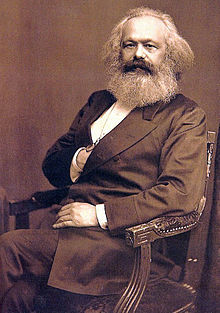Karl Heinrich Ma rx (5 May 1818 – 14 March 1883) was a German philosopher, economist, sociologist, historian, journalist, and revolutionary socialist.
rx (5 May 1818 – 14 March 1883) was a German philosopher, economist, sociologist, historian, journalist, and revolutionary socialist.
Karl Marx’s work in economics laid the basis for the current understanding of labour and its relation to capital, and has influenced much of subsequent economic thought.
He published numerous books during his lifetime, the most notable being The Communist Manifesto (1848) and Das Kapital (1867–1894).
Marx’s theories about society, economics and politics – collectively known as Marxism – hold that human societies progress through class struggle: a conflict between an ownership class that controls production and a dispossessed labouring class that provides the labour for production. He called capitalism the “dictatorship of the bourgeoisie,” believing it to be run by the wealthy classes for their own benefit; and he predicted that, like previous socioeconomic systems, capitalism produced internal tensions which would lead to its self-destruction and replacement by a new system: socialism.
Marx has been described as one of the most influential figures in human history.
Revolutionary socialist governments espousing Marxist concepts took power in a variety of countries in the 20th century, leading to the formation of such socialist states as the Soviet Union in 1922 and the People’s Republic of China in 1949. Many labour unions and workers’ parties worldwide are influenced by Marxism, while various theoretical variants, such as Leninism, Stalinism, Trotskyism, and Maoism, were developed from them.
Workers of the world unite! You have nothing to lose but your chains.
The philosophers have only interpreted the world, in various ways: the point, however, is to change it
Last words are for those fools who believe they have not yet said enough…
The oppressed are allowed once every few years to decide which particular representatives of the oppressing class are to represent and repress them.
Social progress can be measured by the social position of the female sex.
History is not like some individual person, which uses men to achieve its ends. History is nothing but the actions of men in pursuit of their ends.
Religious suffering is, at one and the same time, the expression of real suffering and a protest against real suffering. Religion is the sigh of the oppressed creature, the heart of a heartless world, and the soul of soulless conditions. It is the opium of the people.
The writer must earn money in order to be able to live and to write, but he must by no means live and write for the purpose of making money.
Landlords, like all other men, love to reap where they never sowed.
The theory of Communism may be summed up in the single sentence: Abolition of private property.
Men make their own history, but they do not make it as they please; they do not make it under self-selected circumstances, but under circumstances existing already, given and transmitted from the past.
Something that is merely negative creates nothing.
No production without a need. But consumption reproduces the need.
The circulation of capital realizes value, while living labour creates value.
Money is itself a product of circulation.
The capitalist cannot store labour-power in warehouses after he has bought it, as he may do with the raw material.
Capital is dead labor,that vampire-like, only lives by sucking living labor, and lives the more, the more labor it sucks.
Capitalist production, therefore, develops technology, and the combining together of various processes into a social whole, only by sapping the original sources of all wealth — the soil and the labourer.
A man cannot become a child again, or he becomes childish.
Everyone who knows anything of history also knows that great social revolutions are impossible without the feminine ferment.
If anything is certain, it is that I myself am not a Marxist.
Private property has made us so stupid and partial that an object is only ours when we have it, when it exists for us as capital … Thus all the physical and intellectual senses have been replaced by … the sense of having.

